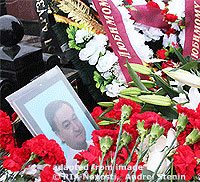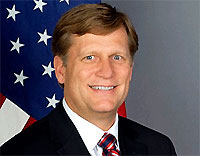McFaul Says Magnitsky Bill Unneeded
Nikolaus von Twickel - Moscow Times - themoscowtimes.com - 6.8.12 - JRL 2012-104
The so-called Magnitsky bill is unnecessary because U.S. President Barack Obama's administration has already dealt with demands to punish Russian officials involved in human rights violations, Ambassador Michael McFaul said Thursday.

McFaul pointed out that the U.S. State Department now had "enhanced powers to review" immigration cases. "In our view, this issue has been resolved," he said.
The ambassador added that the State Department had a "watch list" of Russian citizens that was "really, really long," but that overall the refusal rate for Russians applying for U.S. visas was relatively low.
McFaul was speaking at a question-and-answer session with students at Moscow's New Economic School, just as the news broke that the House of Representatives' Foreign Affairs Committee had moved the controversial bill forward.
 He did not comment directly on the bill's passing but said he thought that it had helped raise attention to the issue.
He did not comment directly on the bill's passing but said he thought that it had helped raise attention to the issue.
The ambassador's appearance before the students came just two weeks after a similar one at the Higher School of Economics, which led the Russian Foreign Ministry and the Kremlin to accuse him of undiplomatic behavior for suggesting that Moscow had "bribed" Kyrgyzstan over the Manas air base.
This time McFaul delivered the same lecture about the "reset" in U.S.-Russian relations, but he apologized again for having used the word "bribe" to describe both Washington and Moscow's attempts to secure the military base in the Central Asian country. "I should have said 'economic assistance package,'" he told the audience, which reacted with laughter.
"It is an empirical fact that I am not a professional diplomat, but that is no excuse to make mistakes that do not help us to promote our national interest," he said.
But the ambassador was adamant that he represents his country not just to the government but all of Russia and that he would continue to engage with society directly, via media and social networks like Twitter and Facebook, even though he admitted receiving at least one tweet per day with "[expletive] you" from Russian Twitter users.
"I came here with a mandate from [Secretary of State Hillary] Clinton to be a 21st-century diplomat. She told me to 'get out there because if we are not in that space, were only playing in one dimension,'" he said.
McFaul also renewed his criticism of RT, the state-funded English-language television channel formerly known as Russia Today. He recalled the channel's campaign in Washington a few years ago that included billboards with Obama and Iranian President Mahmoud Ahmadinejad and the catch phrase "Who Poses the Greater Nuclear Threat?"
"We took issue at that," he recalled. "This was a rather strange paradigm that is not in the spirit of our relationship," he said. But he added that he had since met with the channel's editor, Margarita Simonyan.
Much of the U.S.-Russian reset was about overcoming stereotypes, McFaul said.
"A common misconception among Americans is that Russians love dictatorship," he quipped. "That's a stereotype we must undermine."
Keywords: Russia, Assassinations, Beatings, Prison Deaths - U.S.-Russian Relations, Ambassador Mike McFaul - Russian News - Russia
Mathematician Sergei Mavrodi, the fraudster behind the MMM pyramid scheme in 1994, has taken advantage of modern technology to establish a new series of schemes, MMM-2011 and, this year, MMM- 2012.

There is probably no Russian older than 21 who has not heard of MMM, the notorious scheme that, when it crashed months after its creation, left millions of investors empty-handed.
Still, Mavrodi's schemes have proven popular since his release from prison in 2007, with the widespread availability of the Internet, online banking and numerous payment systems removing the need for offices or cash machines.
How they work
Pyramid schemes involve one investor recruiting others to participate simply by putting money in. The only benefits being derived, however, are when new investors join and their recruiters get a cut of the investment. Nothing is being produced for sale, so no new profits are being made.
"The principle of the system is the same nothing is created and the money is redistributed," said Genrikh Penikas, a teacher at the Higher School of Economics who created a model of the MMM-2011 pyramid and predicted its crash in June 2012.
His prediction seems to have come true, as by the beginning of June there was less than 1 percent of the pyramid's money available for each ruble invested, according to Penikas, about 4 to 5 rubles for every 1,000.
"It is inevitable that one day somebody would like to get his money back," he told The Moscow News. "And it may be not just one person, but many of them, so there will be nothing left in the system."
Full disclosure
Unlike in 1994, in 2011, Mavrodi alerted potential investors that his new project was a pyramid and that they would risk losing all their money. Neither the risk nor Mavrodi's notorious reputation seemed to discourage people, many of whom had witnessed the crash of the first MMM. At the beginning of this month, there were 35 million participants according to Mavrodi, and about 10 million according to officials.
"Unfortunately, in modern Russia the line between good and bad, sick and normal, moral and immoral is blurred," said Andrei Yuryevich, deputy director of the Institute of Psychology at the Russian Academy of Sciences. "If a compromised politician runs for a seat once again, or an official is promoted after being caught stealing, which is quite common here, why is an entrepreneur with a tarnished reputation any worse?"
How it starts
The Moscow News contacted one of the desyatniki a person who collects the deposits from new investors, the lowest rank in the MMM hierarchy to ask whether we could take part in MMM 2012. The man, who called himself Rustam, said that the money to cover the interest is taken from other participants.
"Deposits are accepted for a specified period," he said, "when the system accumulates new people, and therefore there is no problem paying the interest." He added that they would not accept deposits before June 15th, but soon would "start working in full force."
Since the pyramid functions more as a social network than a financial institution, with investors making "personal" bank transfers to the desyatnik, there are no regulations that can stop similar schemes. Financial pyramids are not prohibited by law, and MMM is not registered as a legal body.
Risk takers
According to Penikas, there are two kinds of people who invest in MMM: those who believe that the pyramid will spread all over the world and will stay intact forever, and those who hope they will be lucky enough to make a profit, but not unlucky enough to lose. Fundamentally, people's tendencies to take risks is a good thing, Penikas said, but it must be channeled in the right direction.
"It is important for Russia's prosperity that these risks are not applied to something that is not constructive from the very beginning," he said.
Instead of pyramids, he thinks that people who are willing to take risks should start their own businesses, which will be better for the economy and more rewarding for entrepreneurs.
"Imagine that everybody makes a deposit in the beginning of the month and gets a 50 percent return by the end of it," Penikas told The Moscow News. "It's wonderful, but one question remains if you know that you are going to get something, why work and create something? If everybody starts thinking like this, nothing would be produced, prices would go up, but you couldn't buy anything, though you would think you had more money."
Falling into the same trap
The RAS's Yuryevich illustrated the situation with new MMMs with an old saying that literally reads as stepping on a rake again and again, hitting oneself in the head, or, if paraphrased, falling into the same trap. This anecdote, he said, expresses one of the characteristics of Russians' national psychology, "We are bad at learning from our mistakes."
"But in the case of MMM, there is another factor," Yuryevich told The Moscow News. "People remember the story of the first pyramid and that the very first investors were lucky, so they want to be in their place, hoping to avoid the sad fate of the investors who came later."